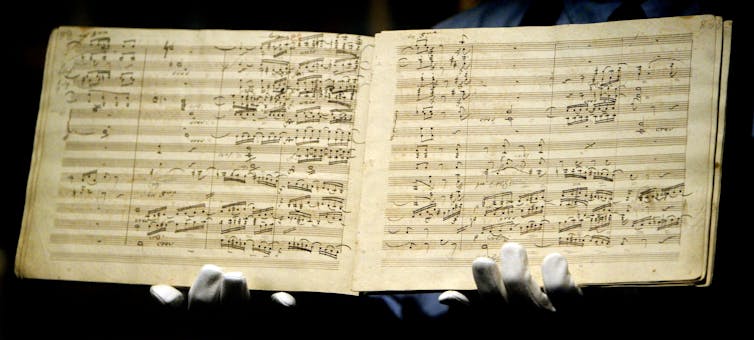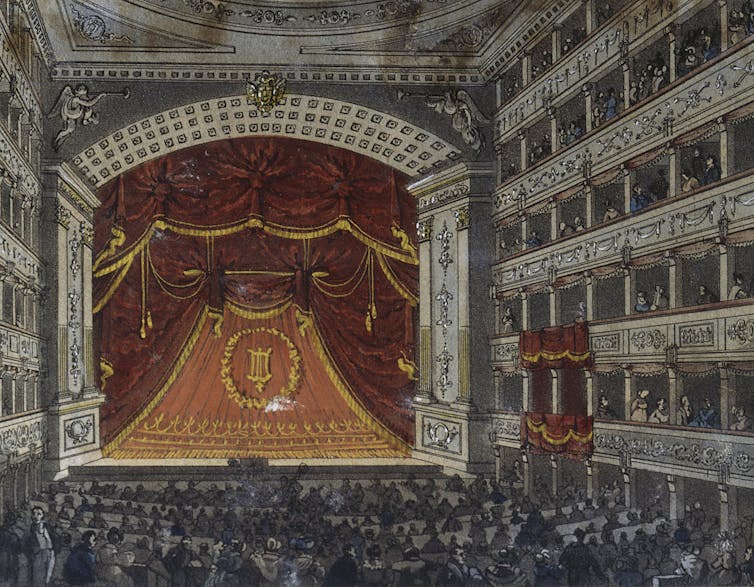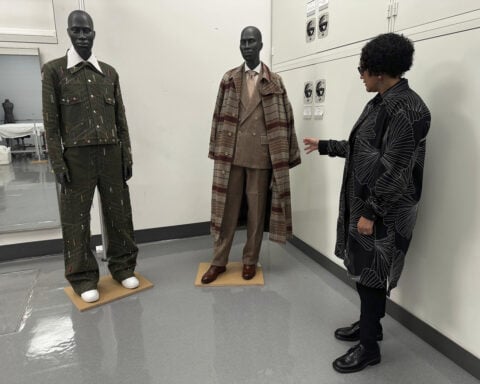On May 7, 1824, Ludwig van Beethoven’s Ninth Symphony premiered in Vienna, Austria. On its 200th anniversary, much was made about this seminal achievement of a composer routinely touted as the greatest master who ever lived.
In an essay for The New York Times, conductor Daniel Barenboim wrote that Beethoven was “the master of bringing emotion and intellect together.”
In another analysis, music historian Ted Olson wrote that the ninth was “the crowning achievement of Western classical music.”
There is no question that Beethoven’s Ninth Symphony is a significant work with “global appeal,” as my colleague Olson put it. I admit to having a soft spot for this piece. As a cellist, I’ve played it twice, once at Carnegie Hall and once while on tour in Asia.
Still, the lionization of Beethoven never sat well with me.
Beethoven backlash
Four years ago, I self-published a blog post under the headline, “Beethoven Was an Above-average Composer: Let’s Leave It at That.”
I had grown tired of notions of the “genius” of the composer, and how we’ve all been taught to put him on a hallowed hilltop as a “great master of the Western canon.”
To say the least, my blog post created quite a stir.
In “Classical Music’s Suicide Pact (Part 1),” Heather Mac Donald, a conservative fellow at the Manhattan Institute, wrote that my blog post was a “Beethoven takedown” and that I had “whiteness on the brain.”
Linguistics professor John McWhorter went so far as to say that I consider Beethoven to be “fetishized by the white establishment.”
To have conservative commentators defend one of their heroes is nothing new, but the backlash to my simple reinterpretation of the composer was contorted beyond recognition.
Reframing ‘The Master’
My intent was to reframe Beethoven’s greatness within the context of historic ideals of whiteness and patriarchy. I thought then – as I do now – that if Americans could acknowledge that our music and music education are deeply rooted in these two ideologies, then we could realize that Beethoven, surely a good composer, was simply one of many.

The manuscript for Ludwig van Beethoven’s Ninth Symphony.
When Beethoven is said to be “one of the greatest” composers, or “the greatest” composer, those who make the claim do so without knowing most of the music that has been made over the centuries.
As I wrote then, Beethoven was definitely above average, but “to say he was anything more is to dismiss 99.9% of the world’s music written 200 years ago, which would be unscholarly, and academically irresponsible.”
To make sense of his veneration, one must believe in narratives of Western greatness and exceptionalism: that the best musical works on our planet were produced by a select few humans from a select few countries, and those humans were, of course, both white and male.
To further confuse the issue, conservative musicologists usually ask the same question: “Well Phil, who then, if not Beethoven?”
But this question is usually offered in bad faith, since there is no acceptable answer for those defending the established norms of music tradition. Whoever is chosen – and I could name many – the questioner can always find fault and be dismissive.
For me, the issue is primarily about whiteness and maleness, their impact on how musical foundations were established, and who gets to define the abstract concept of greatness. It’s not necessarily about finding alternative composers who could never possibly live up to the arbitrary and unrealistic standards that Beethoven purportedly embodies.
To be clear, this is not about “canceling” Beethoven. Instead, it’s about realizing that there were countless others who were no less great than those lionized white male heroes.

Beethoven’s Ninth Symphony premiered at the Kärntnertor Theater in Vienna.
“Cancel culture” is most often used as a cudgel by those on the right against those, like me, wishing to have adult conversations about our fraught racial past.
And there can be no question about the anti-Blackness of American music curricula.
Shifting priorities
The short version of my argument can be summed up grammatically: as a general migration from the definite article “the” to the indefinite article “a.” What was always “the” foundation for music and music education is now becoming simply “a” foundation.
Are chorales by Johann Sebastian Bach “the” foundation for studying harmony and music theory, or simply one of many? And is Beethoven’s Ninth Symphony “the” standard for such symphonies, or just “a” standard?
This grammatical shift has caused panic among conservative voices. But what’s happening in music simply reflects what’s happening throughout society, whether in academia, politics, law or pop culture.
I, for one, welcome reimagining our shared musical foundations and can think of no better composer than Beethoven – and his compelling Ninth Symphony – as a starting point for building new musical foundations.

Philip Ewell does not work for, consult, own shares in or receive funding from any company or organization that would benefit from this article, and has disclosed no relevant affiliations beyond their academic appointment.
Source: The Conversation

 Trump has begun another trade war. Here's a timeline of how we got here
Trump has begun another trade war. Here's a timeline of how we got here
 Canada's leader laments lost friendship with US in town that sheltered stranded Americans after 9/11
Canada's leader laments lost friendship with US in town that sheltered stranded Americans after 9/11
 Chinese EV giant BYD's fourth-quarter profit leaps 73%
Chinese EV giant BYD's fourth-quarter profit leaps 73%
 You're an American in another land? Prepare to talk about the why and how of Trump 2.0
You're an American in another land? Prepare to talk about the why and how of Trump 2.0
 Chalk talk: Star power, top teams and No. 5 seeds headline the women's March Madness Sweet 16
Chalk talk: Star power, top teams and No. 5 seeds headline the women's March Madness Sweet 16
 Purdue returns to Sweet 16 with 76-62 win over McNeese in March Madness
Purdue returns to Sweet 16 with 76-62 win over McNeese in March Madness








